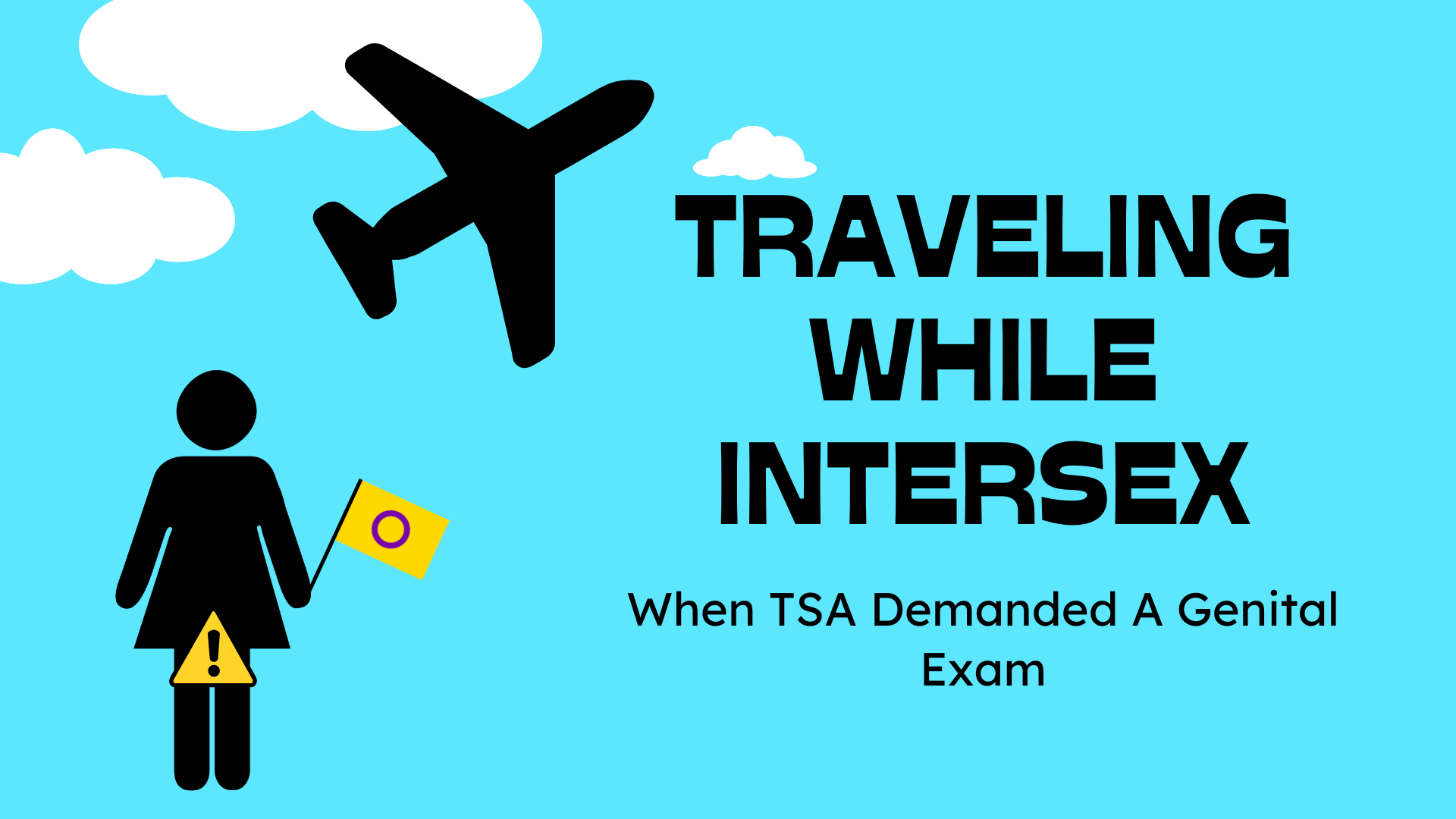At roughly 4:00 PM on July 11, 2025, I found myself standing in a snaking security line at Nashville International Airport. The terminal was buzzing with the usual airport impatience — hundreds of travelers inching forward, shoes in hand, eyes on the clock. As a 46-year-old woman who’s flown many times, I had no reason to expect this day to be any different.
I’ve always been female in every aspect of my life — I was assigned female at birth, raised and socialized as a girl, and have the body to match: a feminine figure with a full bust, typically female bone structure, voice, and demeanor. In fact, I was born intersex with a rare condition, meaning that despite having two X chromosomes (the usual genetic pattern for females), I was born with atypical external genitalia— essentially, a phallic structure with a combination of ovarian and testicular tissues.
In my case, that meant I was born with small genitalia that society would classify as male-appearing — essentially a birth defect affecting my genitals — even though the rest of my body is and always has been entirely female. It’s an unusual trait, but it’s me.
For nearly half a century of life, none of this has ever been an issue. My womanhood has never been questioned by anyone — not by friends, my family, or by doctors in the privacy of medical settings. Yet in the span of a few humiliating minutes, the TSA managed to do just that in front of a packed airport terminal full of strangers.
When it was my turn, I stepped into the millimeter-wave body scanner, feet apart, arms overhead. I held my breath out of habit, waiting for the machine to decide my fate. A yellow silhouette appeared on the agent’s screen — a generic human figure used by the scanner’s software — and I could see a red box highlighting my groin area. The TSA agent’s once-impassive face creased into a frown. Something about my body had triggered the machine’s alarm. “Ma’am, please step aside,” she said, beckoning me over. I felt a jolt of nerves, but complied. I’ve read about these scanners and how they work.
The “Advanced Imaging Technology” scanners are fundamentally designed around a gender binary: the operator selects a “male” or “female” setting for each passenger, and the software expects certain contours on a male body and others on a female body. If your body doesn’t exactly conform to either of those narrow templates, the machine reads it as an anomaly — a potential threat — marking the spot with that ominous red box. In other words, the scanner saw my anatomy — my intersex trait — as suspicious.
I knew, in theory, this could happen. Transgender and intersex travelers have for years been caught in exactly this bind. If a TSA agent guesses or inputs a gender that doesn’t match your body, the machine effectively calls you out. At airports across the country, this has resulted in countless invasive extra screenings for people like me. In fact, many transgender travelers have come to expect an invasive pat-down of their groin area every single time they fly. And if the agent had selected male due to prejudice, it would flag my breast tissue as a presenting anonmaly. I understood all this logically — but nothing could prepare me for what happened next.
The agent — a young woman in a blue TSA uniform — called for her supervisor and informed me that the scanner had detected an “anomaly” in my groin region. I felt my stomach twist. For a moment, I tried to explain discreetly: “I have a medical condition… I was assigned female at birth but a birth defect from when I was born. My body is a little different down there, and it always has been, and this has never been an issue.”
My face was burning with shame as I said it. I wanted so badly to avoid what I knew was coming. But my explanation didn’t seem to register with her. With a thin, unsympathetic smile she replied, “It’s going to be a genital exam or you will not be traveling today, and the airline is not going to refund you.”
Those words hit me like a bucket of ice water. A genital exam. Here, in the middle of the packed security area, beyond the conveyor belts, within view of hundreds of fellow travelers shuffling past us. I glanced at the supervisor — a stocky overweight southern man who had sauntered over — hoping for some sign of empathy or understanding. Instead, he was grinning. He actually appeared amused by the situation, as if my distress was somehow entertaining. A few passengers in line looked over quizzically, but quickly looked away. Not a single person spoke up.
What followed was, without exaggeration, one of the most humiliating moments of my life. The female officer snapped on a fresh pair of blue latex gloves and informed me she would have to take a look. Right there in the open security area — not in a private room — she firmly ran her hands up my inner thighs and then up under my skirt, directly and repeatedly palpating my genital region through my underwear. She proceeded to instruct me to spread my feet while she rubbed her hands along the curves of my buttocks. I remember stiffening like a board, my arms rigid at my sides and my eyes fixed on some distant point, trying to dissociate from my own body. She was essentially groping my genitals and pelvic area in front of an audience of strangers — an act that, in any other context, would be recognized as sexual assault.
What happened to me was not an isolated incident or a fluke — it was the predictable result of TSA policies and technologies that systematically fail people who don’t fit rigid gender expectations.
I felt utterly powerless and exposed. My face burned hot with a mix of anger and embarrassment; I could see a few people in line nudging each other, whispering as they watched the spectacle of a uniformed agent feeling up a traveler’s skirt. Time seemed to stretch and distort. In reality it was maybe a minute or two of “examination,” but every second felt like an eternity. The TSA supervisor — the one who found this funny — stood by casually, arms folded, chuckling at my predicament. When the officer finally stepped back and declared I was “clear,” I felt a wave of relief tempered by rage. I have never felt more violated in my adult life.
In 46 years of living, I had never once been forced to show my genitals to prove I’m female. My birth certificate and all my government IDs list me as female, and they have since birth. In day-to-day life, nobody questions that I am a woman — everyone knows me as such. Yet here I was, essentially having to prove my womanhood to the U.S. government in the most dehumanizing way imaginable. The absurdity would almost be laughable if it hadn’t been so traumatic.
As I regained my composure, that initial shock gave way to a boiling realization: What happened to me was not an isolated incident or a fluke — it was the predictable result of TSA policies and technologies that systematically failpeople who don’t fit rigid gender expectations. This wasstate-sanctioned sexual abuse, plain and simple.
Under any other circumstance, a stranger forcing a hand up my skirt and touching my genitals without consent would be a criminal sexual assault. But because it happened at an airport checkpoint under the color of federal authority, it’s treated as a routine security procedure. That is a horrifying double standard, and I am far from the only victim of it.
I walked away from that checkpoint shaking — adrenaline coursing, tears of frustration pricking at my eyes. It’s hard to convey the mix of emotions. I was deeply ashamed, even though I hadn’t done anything wrong. I was furious that my basic privacy and dignity had been so casually trampled. And I was scared — shaken by the realization of how easily this happened, and that it could happen again.
To be clear, TSA agents are not actively looking to abuse people — they are doing what they’ve been trained to do with the tools provided. And those tools are deeply flawed. The body scanner that flagged me is essentially a product of binary thinking: it expects your body to be 100% male or 100% female, and anything in between, even in my case, due to a biological variation, sets off alarms. Until recently, agents had to manually input a gender selection for each passenger (hitting a “M” or “F” button) — a split-second decision based on your appearance. If the agent guessed wrong or if, like me, your anatomy doesn’t match typical expectations for your gender presentation, the machine will invariably highlight your nonconforming body parts as potential threats. At that point, protocol requires the agent to investigate the anomaly with a physical pat-down or inspection.
This happens all the time to transgender and intersex travelers. In fact, reports of these scanners flagging trans people for extra screening have continued even after the TSA announced plans in 2022 to update to more gender-neutral scanning technology. The “improved” scanners still aren’t perfect — as one trans woman quipped recently, “I thought this wasn’t supposed to happen anymore” when she was flagged yet again despite the new algorithm. So, while the TSA claimed it would replace gendered scanners with gender-neutral technology, the reality on the ground in 2025 is that many of us are still getting flagged and groped due to our bodies.
The civil rights implications of this are staggering. An untold number of travelers are effectively being forced to choose between outing their most private medical information to strangers or else submitting to an invasive search of their genitalia. Some have even faced far worse than what I went through: one transgender woman was reportedly forced to remove her pants in front of TSA agents in order to be cleared to fly. Another trans traveler, model and activist Rosalynne Montoya, described how she is “pretty much always” flagged as an anomaly and has been “groped, grabbed, [and] forced to remove [her] clothing” by TSA in the past. These are not anecdotes from a distant, less enlightened era — this is happening now, to people simply trying to board a plane.
It’s worth noting that TSA’s own guidelines nominally allow passengers some dignity, at least on paper. They say you can request a private screening out of public view, and you’re entitled to have a screener of the gender you prefer perform any pat-down. You can even ask for a traveling companion to accompany you as a witness, and you have the right to speak to a supervisor if something feels off. But in practice, these policies mean little to nothing if officers don’t inform travelers of their options — or worse, if those in charge willfully choose to ignore them.
In my case, no one offered me a private room. The agent didn’t say, “We’ve detected something, would you prefer to step into a private area?” Nor did the supervisor suggest it — he seemed to be enjoying the show. And in that moment, overwhelmed and mortified, I didn’t think to ask for one; I was more concerned about what they were going to do in private, and I just wanted it over with. The burden was on me, the traumatized party, to know and assert my rights.
I challenged them by saying, “whatever you’re planning to do, you’re going to do it right here, right now, in plain and direct view of hundreds of people watching”.
The United States Government is essentially subjecting intersex, transgender, and gender-nonconforming people to state-sanctioned molestation in the name of security.
TSA procedures put vulnerable travelers in impossible positions: either you out yourself publicly (which can be dangerous and humiliating in itself), or you submit to whatever screening the agent deems necessary. Opting out of the scanner entirely isn’t a solution either — if I had preemptively said “I’d prefer not to be scanned,” I would have been subjected to a thorough pat-down anyway. There is simply no avenue in the current system for someone like me to avoid this kind of violation. It’s a damned if you do, damned if you don’t scenario.
The United States Government is essentially subjecting intersex, transgender, and gender-nonconforming people to state-sanctioned molestation in the name of security. Think about it: if a security guard at a mall, a police officer, or a random TSA agent decided to pull a cisgender person aside and put their hands all over their breasts or genitalia, there would be outrage (and likely criminal charges). But because I was born with a well-documented intersex condition and the scanner didn’t know what to make of my body, it suddenly became completely acceptable to treat my most intimate area as checkpoint fodder — to literally feel me up in public to confirm I’m not a threat. I cannot describe any of this as anything other than abusive.
The TSA officer — having thoroughly groped under my skirt and found nothing suspicious except my dignity hanging by a thread — gave a silent nod to her supervisor, who seemed almost disappointed that the search hadn’t turned up anything titillating for him to chuckle over.
Without missing a beat, he barked an order to swab all of my belongings for explosives, as if the absence of contraband on my body somehow necessitated another layer of scrutiny. My backpack, phone, camera, purse— even the inside of my sneakers — were subjected to chemical testing, their surfaces wiped down with little white cloths and fed into a machine that blinked indifferently. It was as if they couldn’t let me go until something — anything — felt vaguely criminal. I wasn’t a threat, but I was inconvenient. And in a system that runs on profiling and humiliation, that was more than enough.
I don’t doubt that airport security is challenging, or that TSA officers have a tough job. But no one should have to undergo what I did just to board a plane. My body — our bodies, for all of us who don’t fit the textbook definitions — are not threats. We are not anomalies or errors; we’re human beings who deserve the same respect and privacy as anyone else. Yes, I understand the need for safety, but safety cannot come at the cost of basic human dignity. The traumatic experience I endured in Nashville was avoidable. It was the result of outdated technology and outdated thinking — a failure to accommodate the reality that human sex and gender characteristics are not always binary.
By the time I collected my backpack and made it to my gate, I felt a profound mix of relief and simmering anger. I was relieved that the ordeal was over and I hadn’t missed my flight. But I was angry — righteously angry — at a system that treated me as less than human. As I sat in the waiting area, replaying the incident in my mind, one thought kept echoing: this should not be happening in a civilized society.
As I write this, I am still processing the emotional fallout. It’s going to take time to shake the feeling of violation. But I’m sharing my story because I know I am not alone — and silence only enables this kind of mistreatment to continue. The TSA, and the government behind it, need to hear this message.
It’s 2025, and it’s long past time to modernize security screening in a way that respects all travelers, not just those who fit neatly into a stereotypical mold. That means deploying truly gender-neutral scanning technology everywhere, rigorously training officers to handle these situations with sensitivity, and always giving passengers the option of privacy and respect. Until such changes are made, what happened to me in that brightly lit checkpoint isn’t just my problem — it’s a human rights problem.










Leave a Reply